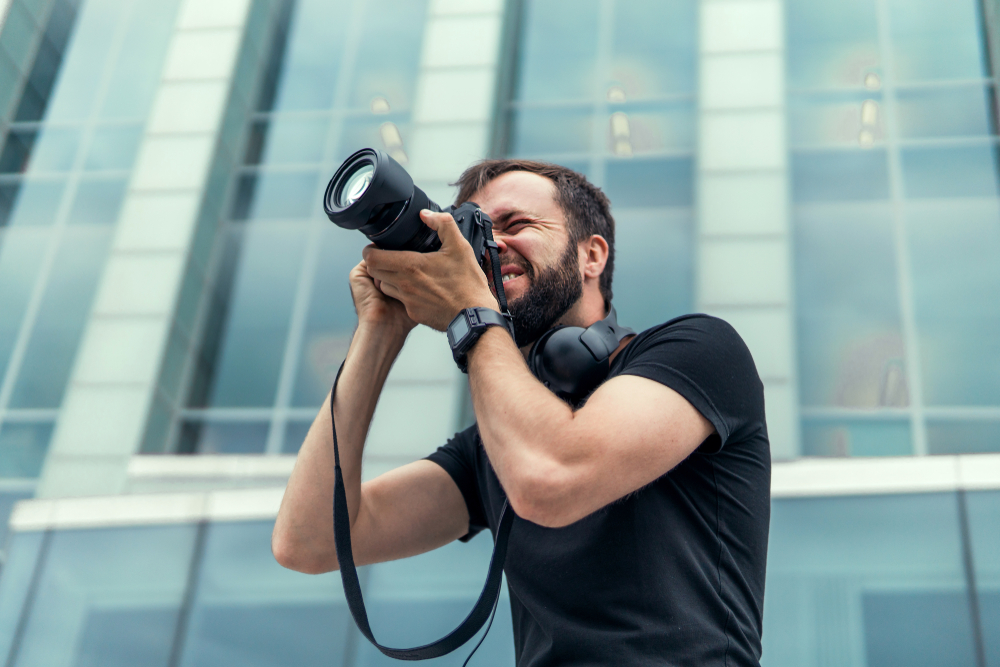Professional photographers can elevate your brand image, boost your marketing efforts, and leave a lasting impression on potential customers. Photographers offer various photography services to meet various business needs, including portrait photography, documenting events, digital marketing materials, real estate, wedding photos, food photography, and additional services like photo retouching and background removal.
Is it worth hiring a photographer?
In an era where content is king, the visual appeal of your products or services plays a crucial role in attracting and maintaining customer attention. Smartphones boast impressive cameras, but there’s a big difference between a snapshot and a professional photograph.
Capturing photos is an art that requires not just an eye for detail but an understanding of how to bring a subject to life, whether it’s through portrait photography, event photography, real estate photography, wedding photography, food photography, or other forms.
A skilled photographer understands lighting, composition, and editing techniques that can make your product, service, or team truly shine. They come equipped with the skills and devices necessary to produce high-quality images. Professional photographers bring their photography style and a creative perspective to showcasing your brand, ultimately making it stand out and competitive.
The creative process behind professional photography plays a significant role in transforming a brand’s image, ensuring that the project’s goals and visions are met.
Here are some benefits of hiring a photographer with high-level skills:
- Quality – professional photos are crisp, evocative, and visually appealing, capturing the essence of your brand.
- Branding – professional photography creates a consistent visual identity that strengthens your brand recognition.
- Marketing – high-quality photos are essential for websites, social media, brochures, and other digital marketing materials. If you need both graphic and written marketing content, check how to find a good copywriter.
In-house vs. freelance photographer
Some businesses consider having an in-house photographer a more cost-effective option, but this may not always be the case. Hiring a full-time photographer involves additional expenses such as fixed salary, benefits, and equipment costs.
On the other hand, outsourcing to a professional photographer gives you access to their expertise and equipment only when you need it, saving you money in the long run. It also allows for a fresh perspective and a diverse range of styles for your brand imagery. Consider your budget, needs, and long-term goals before making a decision.
If you want to go global with your business, freelance deals with a flexible international professional will be a more convenient option than hiring a full-time employee.
Freelance photographer for hire – how to spot a good one
When considering a freelance photographer, look beyond their portfolio. While a strong body of work is essential, it’s just as important to consider their professionalism, flexibility, and communication ability.
The best photographers proactively understand and align with your vision, offering creative suggestions and transparently discussing practicalities such as timings, deliverables, and rates.
When hiring a photographer, several key criteria must be thoroughly evaluated to ensure you make an informed decision that benefits your business:
- Portfolio – look for a photographer whose style aligns with your brand aesthetic. Their portfolio should showcase relevant work, like product photography, if that’s what you need.
- Experience – work experience in your specific industry or with similar project types should also weigh heavily in your selection process, as it can greatly influence the project’s outcome. For example, for professional headshots or personal branding photos, consider hiring a portrait photographer who specializes in creating polished and impactful images.
- Technical proficiency – a photographer’s ability to skillfully use their equipment can significantly impact the quality of your images.
- Creative vision – a photographer’s unique perspective can add immense value to your visual content, underlining your brand voice.
- Communication skills – they’re essential for a smooth workflow, ensuring your vision is accurately translated into the final product.
- Reviews – read online reviews and testimonials from past clients to get a sense of their professionalism and work ethic.
- Reliability and professionalism – these traits are vital for meeting deadlines and maintaining a positive, productive collaboration.
How to find a photographer online
Finding a photographer online has never been easier thanks to platforms like LinkedIn, Instagram, and industry-specific directories or marketplaces. These platforms allow you to explore portfolios and read reviews from previous clients. Research thoroughly and communicate with potential photographers before deciding.
Here are some popular ways to find a photographer on the internet:
- Photography websites – platforms like Behance, Flickr, Design99, or Dribble showcase previous work of freelance photographers and allow contacting them.
- Social media – search Instagram using relevant hashtags to find photographers specializing in your field. Join Facebook groups or online forums related to your industry. Often, members recommend trusted photographers within the community.
- Freelance marketplaces – websites like Useme allow you to browse profiles, post detailed project descriptions and budget. Photographers can then submit proposals, making it easy to compare options.
For more hiring tips, read our article on how to find employees. If you look for several freelancers, also check our article on team management.
Find a freelance photographer on Useme.
Professional photographers’ rates
Rates can vary significantly based on the photographer’s experience, the project’s scope, and specific requirements such as location and deadlines. Some photographers charge by the hour, the day or the project while others may offer package deals.
It’s crucial to clearly understand your budget and discuss it upfront with potential photographers to ensure their rates align with your expectations. Transparent communication about pricing and deliverables helps set a firm foundation for the project and ensures there are no surprises down the line.
Additionally, it’s beneficial to discuss the scope of usage for the images, including rights for reproduction and distribution, as this can impact the overall cost.
Hiring a photographer – managing copyright
By default, the photographer holds copyright on all their photographs. This means they have exclusive rights to reproduce, distribute, and display the images.
As a business owner, you’ll likely need permission to use the photographs for your print materials, website, or social media. These rights are negotiated with the photographer and can be purchased for a fee. The price may vary depending on the scope of usage rights you require. Limited rights for online use will typically cost less than full rights for unrestricted use.
There are various levels of usage rights, each affecting the cost. Here’s a simplified breakdown:
- Print rights – allow you to use the photos in physical formats, like brochures or flyers.
- Web rights – permit use on your company website and social media platforms.
- Distribution rights – grant permission to use the images in marketing materials distributed to a wider audience, such as magazines or advertisements.
Be upfront about your budget and the level of usage rights you need. This allows photographers to provide accurate quotes.
Interviewing a professional photographer
The interview is your chance to assess a photographer’s suitability for your project beyond their online portfolio. Once you’ve shortlisted a few top photographers, reach out via email or phone to express your interest and schedule a video call. Use online scheduling tools like Calendly or Doodle for a mutually convenient time.
Here’s how to prepare for this crucial conversation, ensuring you ask the right questions and gather the necessary information to make an informed decision:
- List your questions – think of matters specific to your specific project needs. Prepare additional questions to delve deeper into areas you find particularly important.
- Project brief – create a concise document outlining your project details, including goals, target audience, and desired aesthetic. Share this with the photographer before the interview so they can prepare.
- Review their work – take some time before the call to revisit their portfolio, focusing on projects similar to yours. This helps you formulate specific questions about the photographer’s approach.
Now, let’s get back to step one. What questions can you ask when trying to find a suitable photographer to take pictures for you? We‘ll give you direct examples that you can reformulate according to your needs.
- Can you walk me through similar projects you’ve undertaken? What specific challenges did you face, and how did you overcome them?
Understanding their experience with projects like yours demonstrates their ability to handle your needs. It also reveals their problem-solving skills, crucial for adapting to unforeseen circumstances during a shoot.
- After reviewing my project details, what creative direction would you propose?
This verifies their ability to translate your vision into visuals. Look for a photographer who asks clarifying questions and is eager to understand your desired outcome.
- Can you outline your typical workflow from pre-production to delivery?
Knowing their process helps you anticipate timelines, communication methods, and potential revision opportunities. A well-defined workflow ensures a smooth and efficient collaboration.
- What type of equipment do you use for this kind of project? Do you have experience using specialized techniques relevant to our needs?
Matching the photographer’s equipment and skillset to your project ensures they can produce the desired results. For instance, product photography might require specific lighting setups the photographer should be comfortable with.
- What is your availability for this project, considering our desired timeline?
Discuss your project timeline and the photographer’s availability to ensure they can meet your deadlines. Explore their flexibility for accommodating any potential delays or rescheduling needs.
- Can you provide a detailed breakdown of your fees, including editing and additional costs?
Transparency in pricing is crucial. Discuss the payment structure upfront to avoid misunderstandings later. Ensure the fees align with your budget and inquire about any hidden costs.
- What are your standard licensing agreements for image usage? Are you open to negotiating custom rights based on our needs?
As discussed earlier, clarifying usage rights protects both parties. Discuss the level of access you need for the images (print, web, distribution) and negotiate a license agreement that fits your budget.
When managing freelancers, pay attention to their communication style, personality, and ability to answer your questions. A good working relationship is essential. Choose someone you feel comfortable collaborating with and who demonstrates excellent communication skills. This fosters a collaborative environment where you can exchange ideas freely.
Discussing the type of ‘photo session’ is crucial to ensure the photographer can meet your business’s specific needs, whether it involves in-person, remote, or product photography or other services. This conversation is key in highlighting the importance of professional photography in enhancing your brand’s relevance, authenticity, and engagement.
Hire a photographer with favorable reviews
Reviews and testimonials offer valuable insights into a photographer’s reliability and quality of work. Look for feedback on their professionalism, ability to deliver on time, and overall satisfaction with the final images. Word of mouth is also a powerful tool, so don’t hesitate to ask your network for recommendations.
Look for recurring themes in positive reviews, such as praising their clear communication, creative vision, or ability to put clients at ease during shoots. It’ll help you shape the image of your future photographer.
During the interview, don’t hesitate to ask for references from past clients with similar projects. Speaking directly with satisfied customers lets you gain a firsthand perspective on their experience working with the photographer.
Many photographers showcase client testimonials on their websites or social media pages. Read them to understand how the photographer interacts with clients and addresses their needs.
Is photo editing included?
When you’re hiring a freelance photographer, don’t assume that they include photo editing or photo retouching in their package. Clarify this upfront, as editing can significantly impact the final look of your images. Some photographers offer comprehensive packages with extensive editing, while others might provide basic retouching or none at all.
Understanding what is included will help you manage your expectations and budget accordingly. Discuss and clarify all aspects of the project before signing contracts or making payments.
How to pay a freelance photographer
The easiest way to settle a deal with a photographer is to sign a legally binding contract and get invoiced after delivering photography services. To avoid excessive paperwork and formalities, you can make transactions with freelance professionals via Useme.
Useme acts as a “bridge” that facilitates the contract and transaction between you and the photographer you choose to work with. It means we prepare a contract, you pay your freelancer through our platform and then we pass the payment to them quickly and securely. You don’t need to deal with hiring procedures, documents, and costs because we will do it for you.
Special Q&A for you
Finding a good photographer for your business needs can be a difficult task. If you’ve got any questions, then we’re here to help.
Ask our team of business experts, industry specialists and lawyers – we’ll come back with the best answers.
How to find photographers – a wrap-up
To summarize the whole process of finding the best freelance photographer for hire, we’ve prepared a list of dos and don’ts.
How to find a photographer – do that:
- Define your needs – think of what photography services you need and what outcome they should deliver for your brand.
- Set a budget – determine how much you can realistically spend on photography services.
- Explore portfolios – look for photographers whose style aligns with your brand aesthetic and project requirements.
- Seek experience – prioritize photographers with expertise in your industry or similar projects.
- Read reviews – use online platforms and client testimonials to assess a photographer’s professionalism and quality of work.
- Prepare questions – develop a list of questions specific to your project and interview potential photographers.
- Request references – ask shortlisted photographers for references from past clients with similar projects.
- Schedule a video call – engage in a video interview to assess communication style and personality fit.
- Clarify usage rights – discuss image usage rights (print, web, distribution) and negotiate a license agreement.
- Confirm editing – ensure photo editing or retouching is included in the agreed-upon fee.
Looking for photography services – don’t do that:
- Don’t skip the interview – investing time in interviewing candidates helps you connect with the right photographer.
- Don’t ignore reviews – positive reviews offer valuable insights into the photographer’s work ethic and client satisfaction.
- Don’t assume editing is included – always clarify if photo editing or retouching is part of the photography package.
- Don’t neglect your budget – set a realistic budget and stick to it when negotiating with potential photographers.
- Don’t focus solely on price – while cost is important, prioritize quality, experience, and communication style over the cheapest option.
- Don’t rush the process – take your time researching, interviewing, and making your final decision.
- Underestimate project scope – clearly communicate your project needs and timeline to avoid misunderstandings.
- Don’t forget about contracts – formalize your agreement with a signed contract outlining deliverables and payment terms.
- Don’t micromanage the photo shooting – trust the photographer’s expertise while providing clear direction and expectations.
- Don’t neglect communication – maintain open communication throughout the process to ensure a smooth collaboration.




